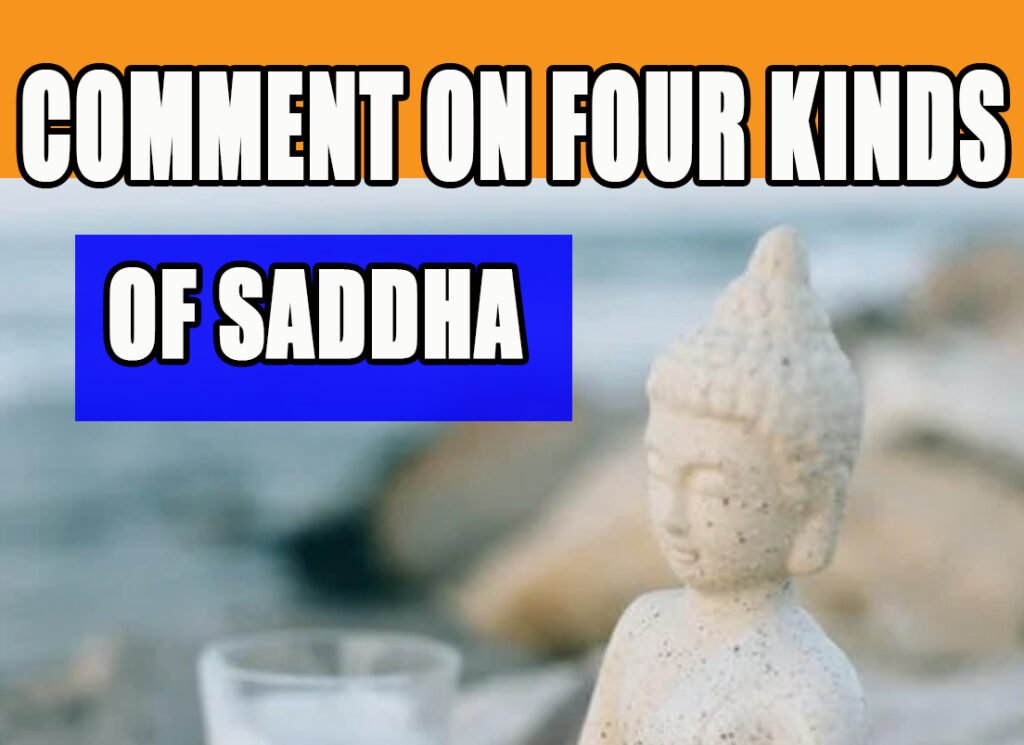
1. Belief in Kamma:
- “Kamma” is Pali language translated as volitional action or what is done volitionally. Karmas are of two kinds, i.e. Kusalakamma translated as wholesome volitional action and Akusalakamma translated as unwholesome volitional action.
- Kusalakammas are alms-giving, adherence to moral principles, contemplation, and doing lots of other good deeds which are the causes of happiness and prosperity in this world and the next world.
- Akusalakammas are the commitment of evil deeds through bodily actions such as killing creatures, stealing others’ properties, and doing something immorally (having sexual relations) with others’ spouses or daughters; through verbal actions such as telling lies, slandering, harsh speech or cursing and other frivolous speech; and through mental actions such as covetousness, ill-will and wrong under- standing which are the causes bringing sufferings both in this world and the next world.
Belief in Kamma is the belief in wholesome volitional actions and unwholesome volitional actions that all living beings always do in their daily lives and all those actions will bring back the results to the doers. Wholesome actions generally divide sentient beings to be noble and unwholesome actions generally divide sentient beings to be ignoble. That is why human beings are differentiated by wealth, by birth and family, by complexion, by consumables, and so on. Some are really wealthy; until they cannot consume all their wealth, some are really poor; until they make their living by begging. All these are the realities of life, ones who are wealthy because they used to give alms and never stole others’ possessions; as for those who are poor and miserable because they never gave alms and used to steal others’ possessions and all that.
- The Exalted One expressed that good deeds consistently lead to happiness and prosperity for beings, facilitate their rebirth in celestial realms, and guide them towards the realisation of transcendent paths and outcomes. Evil Deeds always bring beings to ruin and misery such as bringing beings to be born in woeful states and so forth.
2. Belief in fruits of actions:
fruits of actions are of two kinds, i.e. fruits of good deeds and fruits of evil deeds. The fruits of good deeds are happiness. prosperity and having enough things to consume as one wishes -experiencing ittharammana (satisfying objects). Fruits of evil deeds are misery, destruction and not having enough things to consume as one wishes -experiencing anittharammana unsatisfying objects.
- Belief in fruits is belief as things really are as believing that: Living beings experience happiness, and unhappiness in their daily lives are the results of actions that one did in the previous time. Everything in this world arises from its cause, so lives and whatever we have and experience in these very daily lives are all the effects of the causes -the actions that we did.
- The Exalted One proclaimed that: living beings are experiencing happiness and prosperity such as being satisfied either in the human world or the celestial world or are stepping forward with longevity. Meritorious acts are the source of good physical complexion, happiness, strength, and analytical intelligence in human habitation, among other things. Living beings are going through pain and great apocalypses such as beings who are suffering in great woeful hell and the rest of the sentient beings that are born on the human planet; are meeting with devastation, for instance, the devastation of properties, short life, sickness and the like due to evil actions as its cause.
3. Believing that all living beings have the actions performed by themselves as their own possession:
Worldly property such as gold, money, and the like, which beings call their possession, are liable to destruction by fire, water, thieves, robbers, etc. and cannot accompany them beyond death. The only property that accompanies them is their own volitional actions. Only the physical, verbal, and mental volitional actions of all beings accompany them in this as well as in future existences. They are not liable to destruction by fire, water, thieves, robbers, etc. Owing to that reason the word ‘all living beings have the actions performed by themselves as their own possession is because the actions that are done always accompany the doers everywhere both in this and in the future existences.
- The Exalted One expounded that: all beings have volitional actions as their own possession, as inheritance, as birth, as relatives, and as refuges; what types of actions they perform, even good or bad, they will be the inheritors of those actions.
4. Belief in the realization of enlightenment of Tathāgata:
Is to believe that all the Buddhas who are awake and will be awake in the future must fulfill the virtues that lead to enlightenment such as charity, morality, renunciation, wisdom cultivation, effort, patience, truthfulness, determination, loving-kindness and being full of equanimity towards every being. Then again is to believe in the ten contributions of the Buddha as believing that: he is the one who is far from defilements, perfectly enlightened, fully possessed of wisdom and excellent conduct, proceeding nobly, aware of everything in the world, excellent in virtues like morality etcetera, the trainer of trainable men and women, the teacher of deities and men, the grasper of the four noble truths and to believe that he doesn’t return to be born in this world anymore.
Another way is to believe in the teachings that he taught perfectly inscribed in the sacred scriptures, the commentaries, the sub-commentaries, and many other books. Those teachings are the sublime paths for leading lives toward happiness and prosperity and toward a place without menacing pains.
Do good, be good, do bad be bad This is the law of karma.

